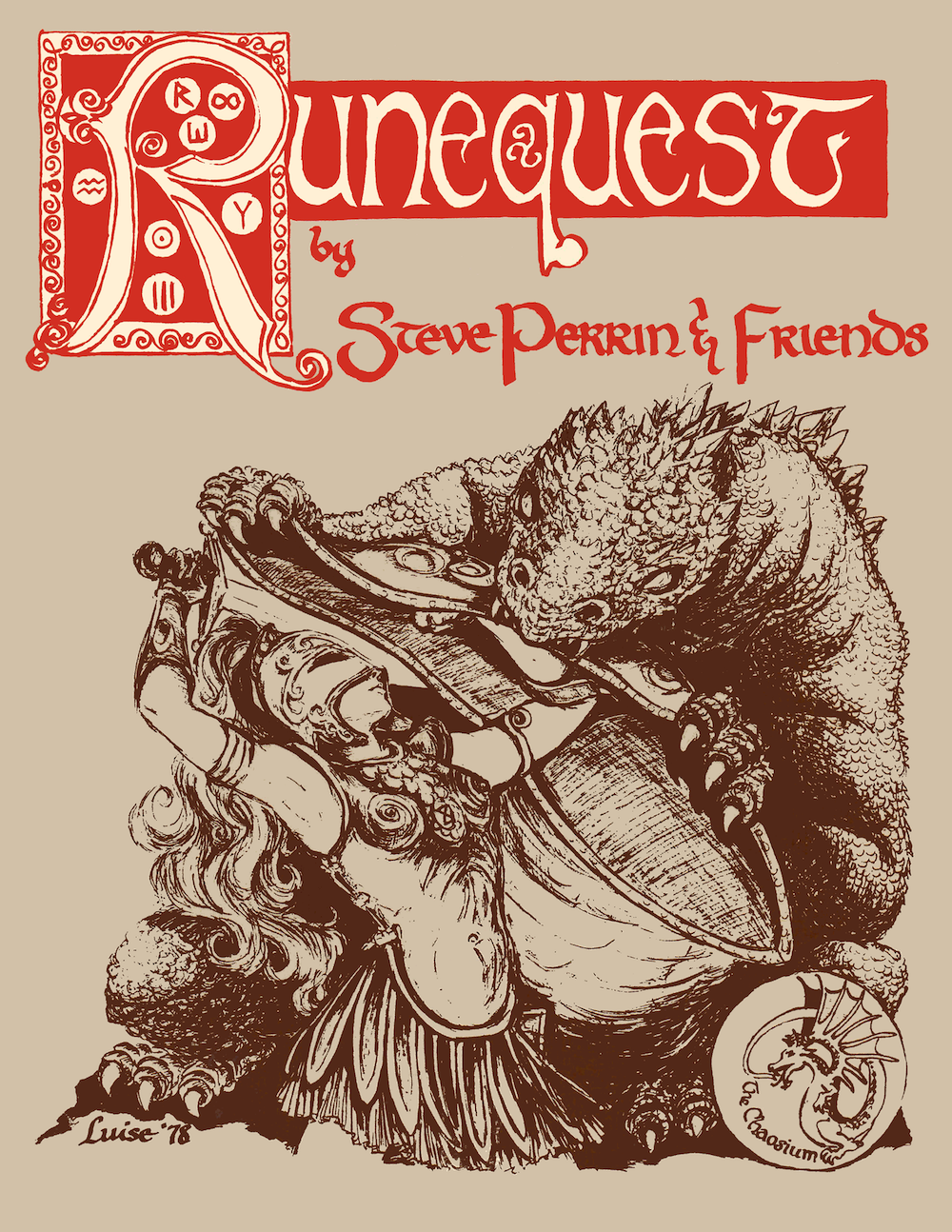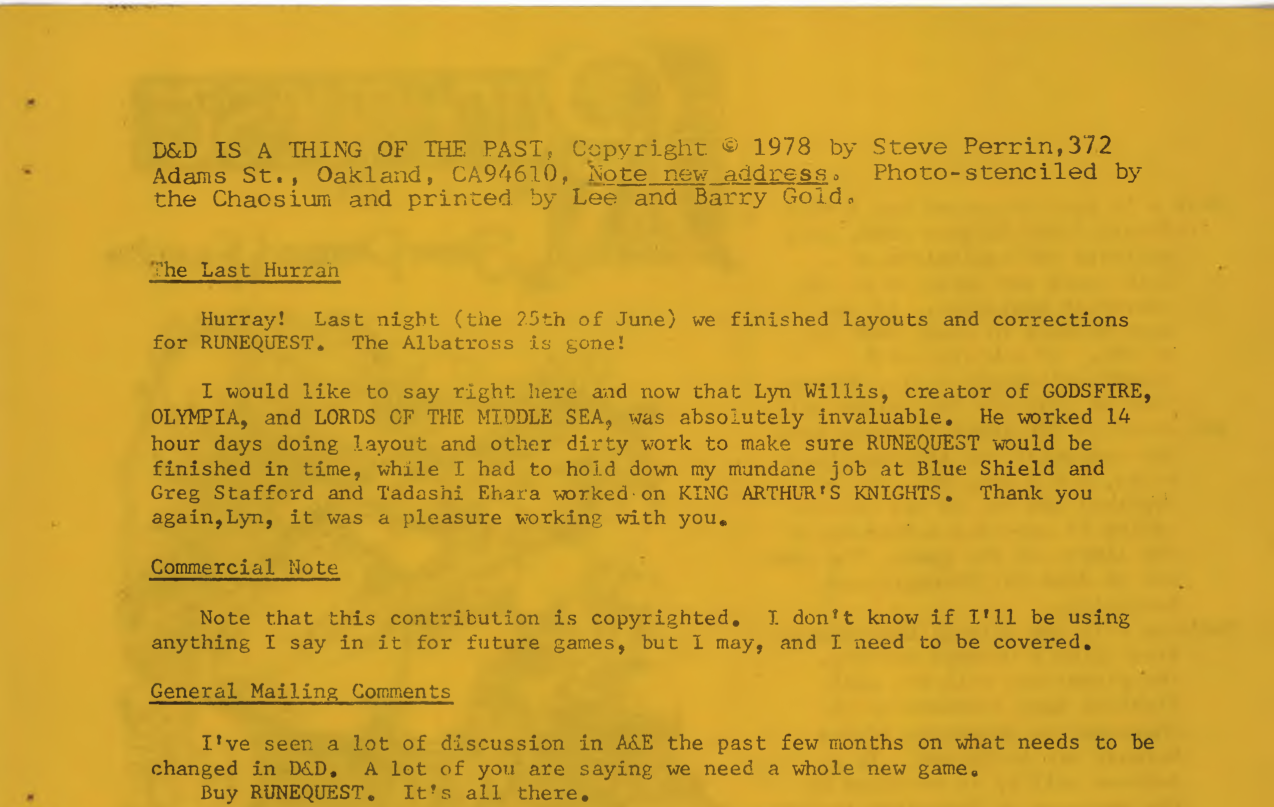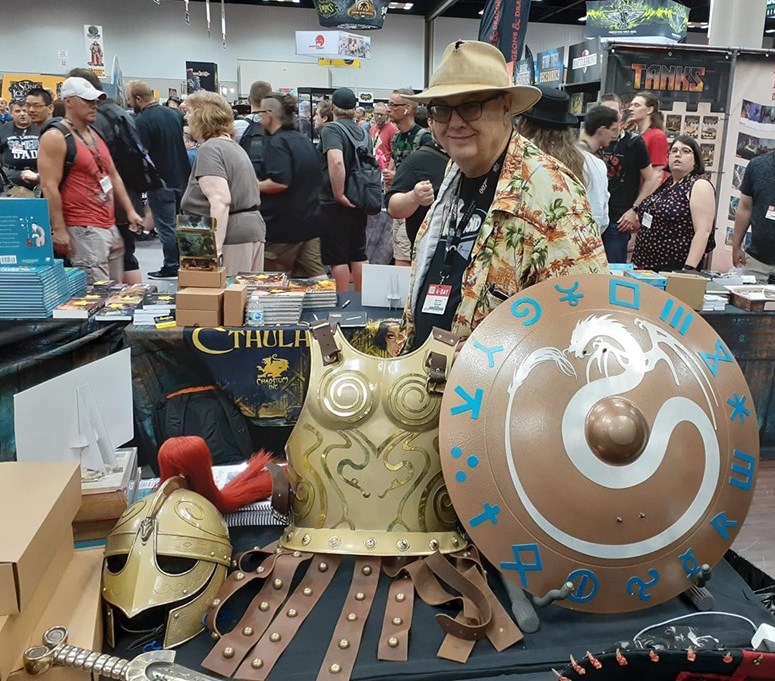Out of the Suitcase #27: "D&D is a thing of the past" - rediscovering how revolutionary RuneQuest was.
Posted by Michael O'Brien on 13th Jan 2022

Chaosium President Rick Meints shares stories from a life-time as a collector of all things Chaosium.
At Gen Con several years ago Steve Perrin and I often chatted while in the Chaosium booth. I enjoyed Steve’s tales of how RuneQuest got developed and what the RPG community thought of the game when it first came out. He mentioned he wrote about those things in Alarums & Excursions back in the 1970s. He said I was free to share what he wrote there with anyone who wanted to know, provided I could find those articles – unfortunately, he lost his copies long ago.
I accepted the challenge of tracking these articles down, even though the chances of finding them were against me. A&E is an Amateur Press Association (APA) magazine that dates back to 1975. In the late 1970s only a few hundred of each issue were printed. Article writers would get a free copy of the issue they appeared in. Publication was far more about being a community than being a commercial enterprise.
As luck would have it, on Sunday I finally found Steve’s article and got to work preserving his words for posterity.
In the September 1978 issue of Alarums & Excursions #37 Steve Perrin laid out, in a very bare bones fashion how RuneQuest, Chaosium’s first RPG, blazed a new trail away from the main RPG that dominated the market. RuneQuest offered a stark contrast to what many players perceived as the one true way to play a game: Experience points, Levels, Fighters can’t cast spells, Magic-users can’t wear armor, and Clerics can’t use edged weapons. RuneQuest turned that world upside down or simply chose to ignore it. Almost 44 years later, we want to share how Steve explained it all those years ago, so here is that article in its entirety:

D&D IS A THING OF THE PAST
Copyright 1978 by Steve Perrin. Photo-stenciled by the Chaosium (Greg Stafford) and printed by Lee and Barry Gold.
The Last Hurrah
Hurray! Last night (the 25th of June) we finished layouts and corrections for RUNEQUEST. The Albatross is gone!
I would like to say right here and now that Lynn Willis, creator of GODSFIRE, OLYMPIA, and LORDS OF THE MIDDLE SEA, was absolutely invaluable. He worked 14-hour days doing layout and other dirty work to make sure RUNEQUEST would be finished in time, while I had to hold down my mundane job at Blue Shield and Greg Stafford and Tadashi Ehara worked on KING ARTHUR’S KNIGHTS. Thank you again, Lynn, it was a pleasure working with you.
Commercial Note
Note that this contribution is copyrighted. I don’t know if I’ll be using anything I say in it for future games, but I may, and I need to be covered.
General Mailing Comments
I’ve seen a lot of discussion in A&E the past few months on what needs to be changed in D&D. A lot of you are saying we need a whole new game.
Buy RUNEQUEST. It’s all there.
Experience Points hassles are gone with the wind. Combat makes sense. There is a legitimate Hit Point system (tied to Constitution) with the chance for increase tied to paying for physical fitness training and limited by the racial maximums and other Characteristics of the character. All Skills are available to be learned, taking time and money. We all know where the money is coming from, don’t we?
Converting one’s D&D Characters to the RUNEQUEST system
The main problem with creating a whole new game system is that we (Steve Henderson, Warren James, Ray Turney and I) have stables of D&D Characters we are fond of which we would like to continue to use in the RUNEQUEST format. Therefore, I’ve devised the following rough guidelines for converting them to a saner game system. I am purposely writing the following as if the reader had a copy of RUNEQUEST before him. If you want to understand the references, buy the game.
New Characteristics
Power - As Power in RUNEQUEST is the measure of the relationship of the character with the gods, and Wisdom could be said to perform the same function in D&D, one can simply use Wisdom for the Power of the Character. Alternately, the player can reroll Power for the character and drop the Wisdom roll entirely (or use it strictly for personal reference). Spell Users should add one point of Power for every Order of Spell over First they know, up to Racial Maximum. If the converter wishes to use the Mages-and-Clerics-as-automatic-Cult-Priests option following, their Power should be simply raised to 18 automatically.
Size - If your character has a size firmly fixed in your mind, just estimate its equivalent in a 3-18 range and apply it to the converted character. If you have nothing in mind, roll it on 3D6. If you play with height and weight rolls, average them or just use the weight roll.
Hit Points - For every Fighting Rank the character has attained (1-3 = 1st, 4-6 = 2nd, etc. for a fighter) add one to his Constitution if possible according to the limits of the game. The same can be done for Strength and Dexterity.
Defense - If the initial Characteristics allow a Defense ability, the player may roll for each Fighting Rank attained by the character to determine if his Defense has increased. If a Defense ability is obtained by. the increase of Dexterity increase shown above, allow one Defense increase roll for every Fighting Rank attained after the necessary initial Defense was obtained.
Conversion of Character Classes
Fighters
First figure the Combat Abilities Natural Ability adds and subtractions from the Characteristics.
If Fighter is of First Fighting Rank (lst-3rd level), his Basic Chance is 20% with his usual weapons, plus all Natural Ability pluses and minuses.
If Fighter is of Second Fighting Rank (4th-6th), His Basic Chance is 30% with usual weapons, plus Natural Ability pluses and minuses
If Fighter is of Third Fighting Rank (7th-9th), his Basic Chance is 45% with his usual weapons, plus Natural Ability pluses and minuses.
If Fighter is of Fourth Fighting Rank (10th-12th), his Basic Chance is 55% with his usual weapons, plus Natural Ability pluses and minuses.
If Fighter is of the Fifth Rank (13th-15th), his Basic Chance is 65% with his usual weapons, plus Natural Ability pluses and minuses.
If Fighter is of the Sixth Rank (16th+), his Basic Chance is 80% with his usual weapons, plus Natural Ability pluses and minuses.
These are the Attack and Parry chances with their usual weapons. Thus, if he has always used Broadsword, he will be at the usual RUNEQUEST Basic Chance with a Large Axe he may pick up.
Use of Magic - This depends on the campaign. Either the magic use is still limited to specialists, as it is in D&D, or the campaign can be opened up to the cross-training found in RUNEQUEST. If the former, Fighter use of magic would be limited to the use of Spell Matrices, and perhaps Bound Spirits...
Magicians
Most games do not allow Mages to wear armor and use most weapons. RUNEQUEST does not bother with these restrictions, but the individual adapter can suit himself. Again, like Fighters, Mages have Attack and Parry abilities commensurate with their Fighting Ranks in D&D. Naturally, this ability only applies to the use of Dagger and, perhaps, staff. Campaigns which let Mages use swords are of course welcome to allow Mage use of sword, too.
If you wish to open up Magic use to all, consider the first four levels of D&D Spells to be Battle Magic Spells and teach them anywhere. Depending on how much you wish to follow the guidelines of low magic use shown in RUNEQUEST, you may wish to take some of the more powerful spells and convert them into Rune (or Higher Order) Magic. I suggest this latter as the most reasonable system, as Fireballs and Lightning Bolts can get very dangerous, even if limited to their level in dice (i.e. 3D6 damage). They are more reasonable as the special spells of specialized Fire and Storm Cults.
I also heavily, urge the Intelligence limits on Spell Knowledge and that Power be the basis for Spell use. This is not absolutely necessary. The RUNEQUEST combat system will fit perfectly well into a regular D&D magic system, as long as multi-dice spells are toned down to their level in damage dice, but the use of the Power system limits Magic sufficiently to keep things on a hand to hand combat basis, which is my own particular prejudice in such things.
Cults
One can have specialized Cults, or assume that every Higher Order Magician is a member of some great Lodge which knows all Rune Power Spells. Clerics would be a separate Cult. If you wish to keep Magicians and Clerics as specialists with no cross-over abilities in the world, you can eliminate the Power of 18 limitation for joining and simply let the initiates build up in some other way to the Higher Order Spells.
If you wish to use the 18-21 Power limits for High Order Mages, with the sacrifice of Power for Higher Order Spells, then equate the following spells as follows:
5th and 6th level Magical, 5th Level Clerical, Spells are 1 Point Higher Magic
7th and 8th level Magical, 6th Level Clerical, Spells are 2 Point Higher Magic
9th level Magical and 7th level Clerical are 3 Point Higher Magic.
The concept of Gods supplying the Magical Power for Higher Order Spells can be dropped in a non-Gloranthan world, with the Mages and Clerics "tapping the Mana flow" or some other such rationale.
Clerics
These are dealt with pretty well as above. They would be tied to Life or Death Rune Cults (or equivalent in religious practices of your campaign). If you wish to keep the 18 Power limitation for their Spells/Prayers/Miracles, there are a number of ways to do it. Assume a Power of 18 to start with, making them earn the Power as Mages, then converting, or perhaps, best of all, forgetting the 18 limitation, at least for minor spells. It's your campaign.
Thieves
These can use all their D&D or Spartan or whatever skills at the level they have earned already. Mostly they correspond to RUNEQUEST skills in any case. The other Skills available under RUNEQUEST will have to be learned from basics. Combat Abilities are dependent on Fighting Rank, as usual. The Thiefly bonus in damage from hitting from behind is lost, as you might expect.
Other Categories
Methods of playing Illusionists (Separate Cult), Bards (Matter of Other Skills), Rangers (proficient Fighters), etc. should be obvious from the other guidelines. I will be glad to answer any questions you may have, but feel free to adapt as you will.
Magical Items
There are two ways to go with these.
- All magical items work as they do now, having both the Spell(s) Matrix and a never-ceasing Power supply.
- All items are Spell Matrices and must be Powered. Thus, a Staff of Wizardry would be a Matrix for all the Spells, but must be powered by the user. In this second case, all Power Storing and Spirit Trapping items from the RUNEQUEST rules must be retained, or the characters will never be able to use all the stuff.
Items which now have Intelligence and Ego should have Intelligence and Power, being Bound Spirits which will engage a character in Spirit Combat when picked up. Of course, a Spirit can be Chaotic, Lawful, or non-aligned, if your campaign uses such concepts. If a character is taken over by the Spirit in the device, the referee should commence playing the character, for Spirit possession is far more drastic than having a character who is simply "controlled" by his weapon.
Specific Examples
A Belt of Giant Strength - will not work as it does in D&D. Instead, it will bring the Strength and Mass (Size) of the character to 21 each, giving them extra damage ability, but not a giant’s massive power. Note that this increase of Size is simply an augmentation of the density of the body affected. It will not affect the previous Strike Rank.
Magic Armor - acts as Protection Spells of variable Power, depending on the Power brought in. Points are subtracted off damage, not hitting ability.
Magic Weapons - Act just as Bladesharp and Bludgeon Spells. You may follow the limitation to +4 or not, as you please.
Monsters
An article on how to adapt ATWM monsters to RUNEQUEST will be in All The Worlds’ Monsters #3. It’s fairly simple.
Money
All money is relative. RUNEQUEST uses the Silver Lunar, but those liking gold can just translate the amounts as you please. You may switch to either base as seems reasonable. Just be consistent.
Further Note on Magic Items
Looking over the previous comments brings to mind one possibility I had not considered, treating the Magic Items as Powered Crystals, each with its own Power which can be used to Power its Spell, but which can be exhausted. For instance, a Wand of Cold might have a Power of 10, and thus be useful for just so many shots a day, although the Power will regenerate over a period of a day. Then again, there is always the further concept of having to attune such an item, and not being able to use any others, but that is rather restrictive for D&D style play.
Another Paving Stone on the Road to Hell
It is my intention to set up two "campaigns."
One will be a very loose D&D style campaign with D&D translated to RUNEQUEST terms much the same way (though not necessarily exactly) as I’ve been discussing, with a D&D style money system, monsters, and treasure. This will be mostly a series of dungeons (reworked versions of my D&D dungeons) with sufficient cultural background and above ground terrain to allow for overland travel and some culture interaction.
The other will be a full-scale Dragon Pass-Glorantha game, set in the Plains of Prax, but extending everywhere, in the years before the advent of Argath Dragonteeth, when he was a simple Sartar refugee Rune Lord in Pavis. Who knows, perhaps he’ll be killed... This will be a far tighter controlled game, set within an ongoing history. Eventually, the players will begin to influence this history. It should be fun. It could end up with us playing a game of White Bear and Red Moon with different Hero pieces...
RUNEQUEST Response
I’m looking forward for a lot of constructive criticism on this game. Try not to mention the typos. We tried to catch them all, but I will tell you right now that "buck roll" should read "luck roll."(See chapter X) If you’d like to put your own Cults through A&E, we will be happy to take them from here and put them in any supplements, for appropriate credit. Note that we will be a lot more discriminating about Cults appearing in any RUNEQUEST supplements than Jeff Pimper and I have been about Monsters appearing in ATWM.
This was the Chaosium’s first effort with typesetting, and it does seem to have worked out all right, though retyping the tables because the typesetters couldn’t do them was a drag. We’ll have to get used to it. Greg Stafford is thinking of buying a typesetting machine. Then again, I’m told there are computer programs for typesetting. Oog, oog, as Nicolai Shapero would say.
Parting Shots
Rereading some of the above I realize that it makes me sound as if I think RUNEQUEST is the ultimate for FRP games, and far superior to anything else on the market. In many ways I do, yet can understand others’ preoccupation with D&D, C&S, and others. RUNEQUEST satisfies my yearnings for a rational game, as it does my co-authors Ray Turney, Steve Henderson, and Warren James. Greg Stafford likes it too, and he’s the publisher. We are very happy with it. It has a lot of expansion possibilities and I look forward to your comments as to where it should go. Thank you all for reading this cathartic little message.
Art Credit
By the way, check out the artwork done by my wife, Luise. It is far and away the finest art appearing in any Fantasy Role Playing Game. Prejudiced? Yes, but I have a lot of confirmation on this. See the cover repro on Page two of this contribution*.
*Luise Perrine's iconic cover image for RuneQuest 1st edition is shown at the top of the page (Luise produced a color version of the same image for RuneQuest 2nd edition).
Next Time
The list of figures stolen from me at DunDraCon III...
Epilogue

And there you have it. As Steve said, RuneQuest serves the yearnings for a rational game. Rediscovering this article only a few months after Steve passed away only makes the contents of it all the more bittersweet. I wish I could have chatted with him about this “cathartic little message” and how he felt about it more than 40 years later.
In the end, like Steve, I very much look forward to where the newest edition of RuneQuest will go, especially because it has so many expansion possibilities. We all know D&D is by no means a thing of the past, nor is it likely to be, just as much as we know that RuneQuest will be a part of Tabletop Roleplaying games far, far into the future as well.
Vale and Farewell, Steve. Your timeless voice still resonates amongst us, reminding us of the humble roots of our passion for stories and the games that allow us to tell them.
